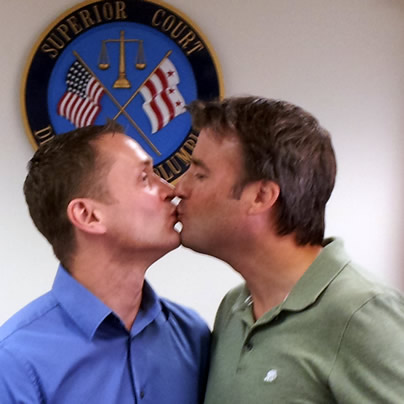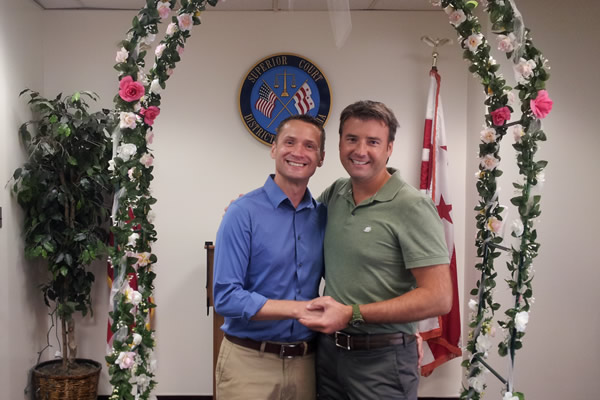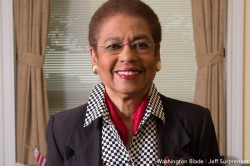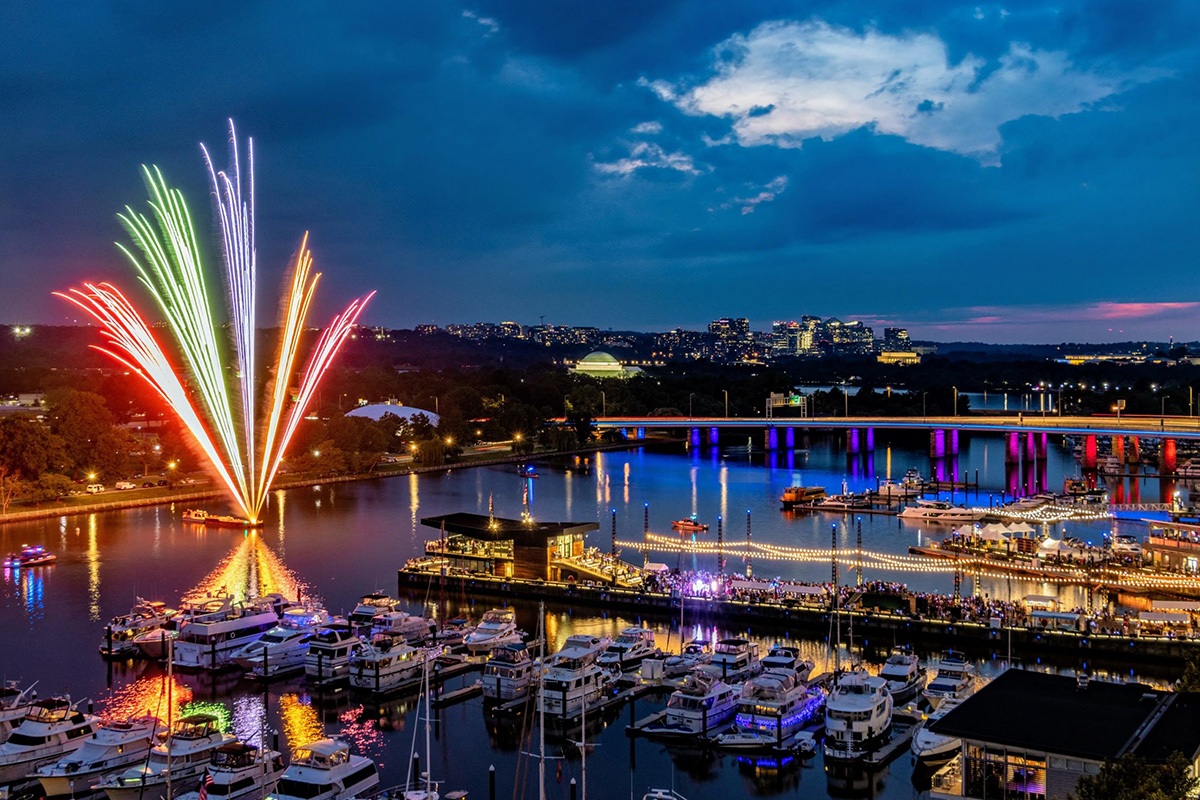Local
Long lines, frayed tempers for couples seeking to wed
D.C. courthouse staff overwhelmed as DOMA ruling triggers boom in marriage applications


David Kero-Mentz and his new husband Ken Kero-Mentz waited two hours for their marriage license to be processed in July. Despite the delay, the couple praised D.C. courthouse staff on the rush of gay marriage license applications following the death of DOMA. (Photo courtesy of the couple)
The number of people applying for a marriage license in D.C. each month has nearly tripled since the Supreme Court issued its landmark ruling on June 26 overturning the Defense of Marriage Act’s provision barring the federal government from recognizing same-sex marriages.
The D.C. Superior Court’s Marriage Bureau doesn’t keep track of the gender or sexual orientation of the couples applying for a marriage license. But court observers say gay and lesbian couples make up the overwhelming majority of the additional couples going to the Marriage Bureau on most days at the courthouse at 500 Indiana Ave., N.W.
“We were sitting there and there were so many same-sex couples,” said veteran lesbian activist and businesswoman Eva Freund in describing the scene in the waiting room at the Marriage Bureau last week as she and her partner of 21 years, Elke Martin, waited to be called to file their application for a marriage license.
The two women, who live in Vienna, Va., are among the large number of same-sex couples from states that don’t recognize gay marriage that are now getting married in D.C., which doesn’t have a residency requirement for obtaining a marriage license.
“We just kind of overwhelmed the place,” Freund told the Blade. “And then they called a name and it was a heterosexual couple. And Elke and I looked at one another and said, ‘What are they doing here?’ And then we said, ‘Oh yeah, they need papers, too.”
According to courthouse observers, Freund’s humorous anecdote may be the exception to the disposition of many of the couples – both gay and straight – who become irritable after waiting two hours or longer while the Marriage Bureau staff struggles to process the seeming explosion of applications since late June.
Ken Kero-Mentz, a U.S. Foreign Service officer, and his new husband, David Kero-Mentz, a German national, described their experience with the D.C. Superior Court’s Marriage Bureau as favorable, even though the two waited close to two hours in early July to have their license application processed. The couple also had to wait about eight weeks for an appointment to be married in a civil ceremony at the courthouse, a service the court began providing long before same-sex marriage became legal in D.C.
“Everyone was so nice to us,” said David Kero-Mentz, who is applying for U.S. permanent residency status now that the longstanding prohibition of immigration rights for gay bi-national couples ended with the Supreme Court ruling on DOMA.
Ken Kero-Mentz said he and David, while thrilled to be legally married, didn’t view their D.C. ceremony as that big a deal because they were joined as a couple in an official “registered life partner” ceremony in Berlin in 2008, with 95 friends and family members in attendance. Under German law, registered life partners have all the rights and benefits of a marriage, including immigration rights for foreign national partners.
The D.C. Superior Court has processed same-sex couple applications for marriage licenses since March of 2010, when the city’s marriage equality law took effect.
Court spokesperson Leah Gurowitz said that prior to the Supreme Court’s DOMA decision in late June, the court received on average between 300 and 400 license applications a month. But in July the number of couples applying for a license jumped to 977 and in August the number of couples applying totaled 908 – more than double the average, Gurowitz told the Blade.
“The D.C. Superior Court is committed to addressing the needs of those seeking our services as promptly as possible,” she said in a statement. “In order to meet the increased demand, additional staff have been detailed to the Marriage Bureau.”
Gurowitz added, “In addition, we are working to locate additional office space to help handle the number of applicants we are currently seeing each day, as well as evaluating work processes to improve our customer service.”
Gay rights attorneys have said they expected more same-sex couples to marry following the Supreme Court ruling, which cleared the way for married same-sex couples to obtain most if not all of the federal rights and benefits of marriage.
The Obama administration’s aggressive effort to quickly implement the DOMA ruling by directing federal agencies, including all the branches of the military, to provide marital benefits to same-sex spouses of federal workers, civilian and active duty military, has also boosted the number of lesbian and gay couples deciding to tie the knot, experts have said.
D.C. gay activist Christopher Dyer, who last year obtained a license to perform marriages as a court-approved officiant, said the number of same-sex couples seeking him out to perform their marriage has doubled since the Supreme Court decision.
“I’m getting more military people than ever before,” he said. “Many of them are from Virginia.”
Local gay rights attorney Michele Zavos, who practices family law in the D.C. metro area, said she and other attorneys familiar with the marriage laws of D.C. and Maryland are advising out-of-state clients to choose D.C. over Maryland as the preferred place to marry.
Although same-sex marriage became legal in Maryland earlier this year, Zavos points out that unlike D.C., Maryland has a residency requirement for couples seeking to get a divorce. This means that if a same-sex couple from Virginia or other states that don’t recognize gay marriage decide to marry in Maryland, they could not obtain a divorce in Maryland unless they become a Maryland resident for a year, Zavos said.
She noted that they couldn’t obtain a divorce in their home state if that state doesn’t recognize their marriage, especially if the state has a law or constitutional amendment specifically banning same-sex nuptials as Virginia does.
“Nobody wants to hear this, of course,” Zavos said. “They’re about to be married. They don’t want you to be talking to them about getting divorced.”
Nevertheless, Zavos said many same-sex couples knowledgeable about the residency rules for divorce are choosing D.C. and Delaware, which also allows out-of-state couples to file for a divorce without a residency requirement.
Among those encountering the brunt of the delays at the D.C. Superior Court’s Marriage Bureau are the private marriage officiants who, among other things, file marriage license applications at the courthouse for their same-sex couple clients.
Deborah Cummings-Thomas and her wife, lesbian activist Sheila Alexander-Reid, co-owners of Marry Me In D.C., Inc., specialize in marrying same-sex couples and taking care of the couples’ marriage-related paperwork.
“It’s a nightmare down there right now,” Cummings-Thomas said. “It often takes two hours, sometimes longer” to file a marriage license application, she said. “I’ve been there when people waiting have gotten very upset.” She said 95 percent of the couples she marries are from jurisdictions outside D.C. and at least 95 percent or more of her clients arrange for her to go to the courthouse to deal with the application.
“The employees are very nice,” said Rev. Starlene Joyner Burns, another D.C. marriage officiant who reaches out to same-sex couples. “But they realize the office needs more help. It’s not a system that is broken. It’s just that the demand is greater than what it was in the past.”

One marriage officiant criticized Del. Eleanor Holmes Norton, claiming she should be doing more to secure funds to hire staff at D.C.’s marriage bureau.(Washington Blade file photo by Jeff Surprenant)
Another marriage officiant, who spoke on condition of not being identified, criticized D.C. Congressional Del. Eleanor Holmes Norton for not pushing for more funds from Congress to hire additional staff at the courthouse to handle the greater demand for marriage licenses.
Congress and various federal agencies control the D.C. court system rather than the city government under the city’s limited home rule charter. Norton spokesperson Daniel Van Hoogstraten said he would look into the matter.
Others familiar with the Marriage Bureau noted that the D.C. City Council could help the situation by changing the wording in the city’s marriage law that requires a three-day waiting period between the time a marriage license application is submitted and the time a marriage can take place. Marriage laws in most other states have a similar waiting period but those states, like Maryland, issue the license during the applicants’ first visit to the state marriage bureau and post-date it to prevent the marriage from taking place until after the waiting period expires.
Critics of the D.C. Marriage Bureau say it requires applicants or officiants working on their behalf to return to the bureau a second time to pick up the license following the waiting period, a process that causes further delays.
But according to people familiar with the D.C. marriage law, the law prevents the Marriage Bureau from postdating a marriage license because it states explicitly that a license “shall not be issued until three days have elapsed” from the time the application is filed.
“They have two people handling 50 or 60 people at any given time,” said the marriage officiant who asked not to be identified. “They told me please do what you can to get out the word and help us get more staff.”
District of Columbia
LGBTQ budget advocates fight for D.C. resources in a tough fiscal year
‘Trying to preserve life-saving services’ amid $1 billion cut

The months and days leading up to June are especially busy for LGBTQ Washingtonians. For one group, the DC LGBT Budget Coalition, which works year-round to ensure LGBTQ residents are represented and financially supported by the D.C. government, this time of year is their Super Bowl. Beginning in April, the D.C. Council and Mayor’s Office hold budget hearings for the next fiscal year.
With D.C.’s budget now under review, the Washington Blade spoke with Heidi Ellis, coordinator of the DC LGBT Budget Coalition, about the group’s top priorities and their push to ensure continued support for queer communities.
“The LGBTQ Budget Coalition was founded in 2020 at the height of the pandemic, as a way for the community to work together to advocate for key funding and policy changes,” Ellis said. “We recognized we were stronger together. A lot of groups are often pitted against each other for resources and dollars. This coalition was founded out of a need for unity. Since then, we’ve successfully advocated for more than $20 million in dedicated LGBTQ investments.”
In addition to coordinating the coalition, Ellis is the founder and CEO of HME Consulting & Advocacy, a firm that helps build coalitions and advance policy initiatives that address intersectional issues in the LGBTQ community. One of its most powerful tools, she explained, is direct outreach through community surveys.
“We actually do community surveys to see what people need and what’s top of mind,” Ellis said. “Of course, we also pay attention to the broader political landscape — like the current threats to HIV funding. That helps us prioritize.”
Because the coalition is comprised of more than 20 organizations across various sectors —healthcare, housing, community organizing — Ellis said its diversity enables it to connect grassroots needs to potential policy solutions.
“Our coalition includes service providers, community groups, health and housing advocates-folks who are deeply plugged into what’s happening on the ground,” she said. “They help determine our direction. We know we don’t represent every queer person in D.C., but our coalition reflects a wide range of identities and experiences.”
The insights gathered through those surveys ultimately inform the coalition’s annual budget proposal, which is submitted to the Council and mayor.
“That’s how we got to our FY26 priorities,” she said. “This year, more than ever, we’re fighting to protect what we’ve already secured — funding and policies we’ve had to fight for in the past. We know there’s concern around this budget.”
One of the challenges this year is that the D.C. government’s operating budget and some of its legislation must be approved by Congress. With a projected decline in tax revenue and a Republican-controlled Congress that has historically opposed LGBTQ funding, the Coalition has had to think strategically.
“Even before the situation on the Hill, the CFO projected lower revenue,” Ellis said. “That meant cuts to social programs were already coming. And now, with the $1 billion slashed from D.C.’s budget due to the continuing resolution, we’re not only fighting for D.C.’s budget and autonomy, but also trying to preserve life-saving services. Our message is simple: Don’t forget about queer people.”
This year’s proposal doesn’t include specific dollar figures. Instead, the Coalition outlines five funding priority areas: Healthcare, Employment & Economic Equity, Housing, Safety & Community Support, and Civil Rights.
Why no exact amounts? Ellis said it’s because not all solutions are financial.
“Some of our asks don’t require new funding. Others build on existing programs-we’re asking whether the current use of funds is the most effective. We’re also proposing policy changes that wouldn’t cost extra but could make a real difference. It’s about using what we have better,” she said.
When drafting the proposal, the Coalition tries to prioritize those with the most pressing and intersecting needs.
“Our perspective is: If we advocate for the most vulnerable, others benefit too,” Ellis said. “Take LGBTQ seniors. Some may have done well in life but now face housing insecurity or struggle to access affordable healthcare. Many in our coalition are elders who fought on the frontlines during the AIDS epidemic. They bring critical historical context and remind us that Black and brown communities bore the brunt of that crisis.”
“I love our coalition because it keeps us accountable to the moment,” she added. “If we center those most marginalized, we can make an impact that lifts everyone.”
In addition to healthcare and housing, safety remains a top concern. The Coalition has fought to maintain funding for the Violence Prevention and Response Team (VPART), a city-supported group that includes MPD, community-based organizations, and the Mayor’s Office of LGBTQ Affairs. VPART responds to crimes affecting the LGBTQ community and connects victims to legal, healthcare, and housing services.
“We’ve pushed to make VPART more proactive, not just reactive,” Ellis said. “The funding we’ve secured has helped survivors get the support they need. Cutting that funding now would undo progress we’re just beginning to see.”
At the end of the day, Ellis emphasized that this process is about far more than spreadsheets.
“A budget is a moral document,” she said. “If we’re not represented, you’re telling us our lives don’t matter at a time when we need protection the most. When people can’t get food, medicine, housing — that has a devastating impact. These are vital services.”
The DC LGBT Budget Coalition is urging residents to support a letter-writing campaign to D.C. Council members and the mayor. You can send a letter here: https://actionnetwork.org/letters/fully-fund-dcs-lgbtq-communities
Read the full FY26 budget proposal here: https://drive.google.com/file/d/1bTrENnc4ZazJTO6LPrQ3lZkF02QNIIf1/view
Arts & Entertainment
Washington Blade’s Pride on the Pier returns bigger than ever with two-day WorldPride celebration

The Washington Blade’s Pride on the Pier will be extended to a two-day celebration in honor of WorldPride coming to D.C. this year. Taking place on Friday, June 6 and Saturday, June 7 at The Wharf, this year’s event promises more entertainment, more community, and more pride than ever before — all set against the stunning waterfront backdrop of our nation’s capital.
With the addition of Friday, the party kicks off at 3 p.m., with the inaugural WorldPride Boat Parade at 7 p.m. As an Official WorldPride Partner event, the boat parade will feature 30 decorated boats parading along the Washington Channel. For information on signing up for the boat parade contact Stephen Rutgers at [email protected].
Saturday’s signature Pier Party kicks off at 12 p.m., featuring a drag show, DJ’s, streaming of the WorldPride Parade, and the iconic Fireworks Show Presented by the Leonard-Litz Foundation — one of D.C. Pride’s most anticipated spectacles.
“We’re expanding Washington Blade Pride on the Pier to reflect the excitement and momentum building for WorldPride in D.C.,” said Blade publisher Lynne Brown. “It’s a celebration of our community’s progress and a powerful reminder of the joy and visibility Pride brings to the heart of our city.”
Now in its seventh year, Washington Blade Pride on the Pier extends the city’s annual celebration of LGBTQ visibility to the bustling Wharf waterfront with an exciting array of activities and entertainment for all ages. The District Pier will offer DJs, dancing, drag, and other entertainment. Alcoholic beverages will be available for purchase for those 21 and older.
Pride on the Pier is free and open to the public, with VIP tickets available for exclusive pier access, hosted bars, and private viewing areas for the boat parade and the fireworks show. To purchase VIP tickets visit www.prideonthepierdc.com/vip.
Friday VIP: 5-9 p.m., enjoy an air-conditioned lounge, private bathroom, cash bar and complimentary drink.
Saturday VIP Session #1: 2-5 p.m., enjoy an air-conditioned lounge, private bathroom, catered food, and an open bar.
Saturday VIP Session #2: 6-9 p.m., enjoy the air-conditioned lounge, private bathroom, catered snacks and dinner, and open bar with a front-row view of the fireworks.
Event Details:
📍 Location: District Pier at The Wharf (101 District Sq., S.W., Washington, D.C.)
📅 Dates: Friday, June 6 & Saturday, June 7, 2025
🛥️Boat Parade: 7 p.m. (June 6). 🎆 Fireworks Show: 9 p.m. (June 7)
🎟️ VIP Tickets: www.PrideOnThePierDC.com/VIP
Event sponsors include Absolut, Capital Pride, DC Fray, Infinate Legacy, Heineken, Leonard-Litz Foundation, Mayor’s Office of LGBTQ Affairs, Relish Catering, Washingtonian, and The Wharf. More information regarding activities will be released at www.PrideOnThePierDC.com
Maryland
Md. schools plan to comply with federal DEI demands
Superintendents opt for cooperation over confrontation

By LIZ BOWIE | Deciding not to pick a fight with the Trump administration, Maryland school leaders plan to sign a letter to the U.S. Department of Education that says their school districts are complying with all civil rights laws.
The two-paragraph letter could deflect a confrontation over whether the state’s public schools run diversity, equity, and inclusion programs that the Trump administration has called illegal. The Baltimore Banner reviewed the letter, which was shared by a school administrator who declined to be identified because the letter has not yet been sent.
Maryland school leaders are taking a more conciliatory approach than those in some other states. Education leaders in Minnesota, New York, Colorado, Oregon, Vermont, and Wisconsin said they will not comply with the federal education department’s order, the demands of which, they say, are based on a warped interpretation of civil rights law.
The rest of this article can be found on the Baltimore Banner’s website.
-

 Opinions5 days ago
Opinions5 days agoIt’s time for new leadership on the Maryland LGBTQIA+ Commission
-

 The White House5 days ago
The White House5 days agoWhite House does not ‘respond’ to reporters’ requests with pronouns included
-

 Arts & Entertainment5 days ago
Arts & Entertainment5 days ago‘Gay is Good’ Pride Pils Can Celebrates Frank Kameny’s 100th Birthday for WorldPride in D.C.
-

 Sponsored5 days ago
Sponsored5 days agoTHC Drinks: What You Should Know About Cannabis Beverages











